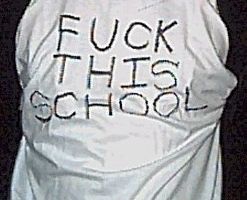|
|||||||||||||
|
By Punkerslut
Nobody really liked the school I attended. In fact, the rules were ridiculous, to the point where even those who weren't politically minded were enacting Direct Action due to their frustrations. For instance, to travel from one end of the school to the other would take 4 minutes, but failure to appear in class in 2 minutes would get you a detention, without a real inquiry into the matter. In every way, I tried to revolt, rebel, do what my heart desired. During the massive wave of Patriotism after the event of 9-11, my school emblazed the corridors with Americanism and Nationalist propaganda. I responded cunningly: I printed out some Dr. Seuss cartoons, one which featured a mother reading a story to her children, "And the big bad wolf Adolf ate up the little children, but it was okay, because they were foreign children," and then taping them to various walls in the school. (Yeah, that was me.) On the first day of school of my senior year (which I dropped out after two months), the teacher asked if there were any questions about the manual. My hand was the only one raised, and I asked, "When they wrote this, why did they think it was a good idea to imitate a South American Dictatorship?" Then, my school was holding an event known as "Spirit Week," where each class had their own colors and were supposed to wear those colors to school. In a way, it was patriotism in a lower level. On the last day, where there were contests and whatnot, I decided to express my opinion. I went into school wearing a shirt that said, "Fuck This School." They told me to take it off, or I wouldn't be allowed to class. I refused. And just to conduct a bit of a social experiment, I went to the police department to see if the Tinker Supreme Court case meant anything, and the police officer responded to me, "Student rights? Are you serious?" The only time I have ever seen a police officer arrest someone, or beat someone, was because of what they said or because they were homeless. This time was no different. What I noticed to be so interesting about my act of revolt with the shirt was that not a single soul existed in my school who was offended by my actions. In fact, when news spread around (which, especially with this, it went extremely quickly), and I was leaving the building, numerous people out of class went up to me and shook my hand, even those who I didn't know. Every one of them seemed pleased that I had the courage to oppose an unjust school system and an incredibly ignorant school administration. Months would pass, and I would come to pick up the book, The Elements of Journalism, by Bill Kovach and Tom Rosenstiel. In it, I found something remarkably similar to my experiences at my high school...
When I read this, I couldn't help but notice the similarity of authority and its relation to the rights of the people. In my compulsory "education" school, the fact that I had the boldness to wear a shirt that defied the opinions of the rulers was inspiration. So were the alternative media to the Polish. But still, in both situations, liberty was destroyed. The government doesn't want it yet the people long for it. But, can such a comparison, between a school and a Totalitarian nation, be justified? I think it can. In both situations, there is no real choice for any person who is subjected to the laws, and in both situations, no person determines the rules they are under. The modern school system, so much of a "benefit" that it is, simply instills people with a hatred for anything intelligent, and still more, the belief that no matter how hard they fight their oppressors, they will always lose in the end. Maybe there ought to be more revolting going on, more refusal and resistance to the orders of the government. As Martin Luther King Jr. once wrote, "One who breaks an unjust law must do so openly, lovingly," ["Letter from a Birmingham Jail," by King in 1963.]. When we look to the words of our heroes, we find precisely what our teachers, our principals, our senators, our governors, our mayors, what our president speaks out against. That which inspires a person to become involved is the greatest enemy to organized authority, and it is with that, that poets and activists become the greatest ally of truth and humanity. Punkerslut,
|



